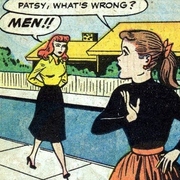|
cis autodrag posted:Hey welcome. We're trying to avoid this sort of joke here since yospos has had some self harm incidents in the last when people felt harassed about their sexuality. Had a full torso done mid Nov, took out about 2 liters. Super uncomfortable for the first few days, but I could pretty much take care of myself from day 2. I think the compression suit ended up being more uncomfortable than the other thing but I am super happy with the result. Doc said I could stop wearing it after week 3, but I'm still wearing shapewear to help minimize movement because its still a little tender now. Only a tiny bit of swelling left. Lets see... I only have my appendectomy as any point of reference. Its just uncomfortable and sore, not argh kill me like recovering from that. Recommendation, get shapewear covering the same area as your compression suit will, so you can wash one and wear the other. There'll be leaky spots. 
|
|
|
|

|
| # ? May 20, 2024 06:05 |
|
cis autodrag posted:I've heard lipo is the most awful to recover from and it's next in my list.
|
|
|
|
i met a dude on tinder that also loves jodorowsky films gonna try and get a date asap, but i don't want to come off as too eager but i'm also in love
|
|
|
|
Improbable Lobster posted:i met a dude on tinder that also loves jodorowsky films 🎉🎉🎉👏👏👏🎈🎈🎈🎈🎈🎈🎈🎍congrats
|
|
|
|
Improbable Lobster posted:i met a dude on tinder that also loves jodorowsky films Offer him a ticket to the great toad and chameleon circus.
|
|
|
|
i was like "where have i heard that name before..." and then i suddenly remembered the time the cool croatian study abroad student in college introduced me and the other stoner buds to El Topo
|
|
|
|
the holy mountain loving rules
|
|
|
|
it never continues to disappoint me that Jodorowsky never got to finish Dune
|
|
|
|
learning how to love medical professionals in 2018
|
|
|
|
hi, cis straight guy here i just got around to reading this piece by fenton johnson in the january harpers https://harpers.org/archive/2018/01/the-future-of-queer/ his take on gay marriage surprised me quote:In those early years, proponents presented same-sex marriage for what it was: a right-wing initiative whose goal was to enable the Republican grandparents of Peoria to feel comfortable inviting their grandchild’s same-sex lover to holiday dinners. At a forum on same-sex marriage held in the late Nineties at New York’s Lesbian, Gay, Bisexual and Transgender Community Center, several architects and engineers of the initiative to single out the legalization of marriage as the principal—indeed, the only—issue of consequence for the LGBT community argued that the legalization of same-sex marriage was an essentially conservative undertaking. State-sanctioned marriage would tame an impassioned bunch of outlier renegades. i guess i had always uncritically thought of gay marriage as cool and good. for johnson, the problem is: gay marriage was pursued at the exclusion of other, possibly more important/relevant, goals of the lgbt community. in other words, the more establishment faction of lgbt used the issue to dominate and subdue the more radical elements i didn't know anything about fenton johnson going into this article -- it's likely i'm missing some context. i thought i would ask the thread about it
|
|
|
|
i think the full article is paywall'd, so i decided to just quote the whole thing sorry for taking up so much space with this. BTW it talks a lot about AIDS before it was treatable. i thought i should mention in case anyone wants to give the article a miss for that reason quote:In the spring of 2017, for the first time since publishing a memoir set at the height of San Francisco’s AIDS epidemic, I summoned the nerve to teach a course on memoir—which is to say, at least as I taught it, a course on the necessity of personal witness, a course against forgetting. Mostly I avoided the subject of AIDS, not wanting to be the grizzled old veteran croaking war stories to a classroom of undergraduates. But since AIDS memoirs are among the best examples of the genre, I decided I had to foray into the minefields of those memories. I surprised myself by choosing not one of several poignant memoirs but the edgy anger of Close to the Knives, by the artist David Wojnarowicz, with its hustler sex and pickup sex and anonymous sex on the decaying piers of Chelsea and amid the bleak emptiness of the Arizona desert, one eye cocked at the rearview mirror to watch for the cop who might appear and haul your naked rear end to the county jail, sixty miles of rock and creosote bushes distant.1 Wojnarowicz was thirty-seven years old when he died of AIDS in 1992. there's one footnote quote:1
|
|
|
|
He's right on some things but dead wrong on others. Things change, and I might have agreed with this 20 years ago but its 2018, the goalposts have been dragged around so much and conservatives of the type he's talking about dont exist anymore and the ones that are here now would rather we not exist at all.
|
|
|
|
Helianthus Annuus posted:i guess i had always uncritically thought of gay marriage as cool and good. for johnson, the problem is: gay marriage was pursued at the exclusion of other, possibly more important/relevant, goals of the lgbt community. in other words, the more establishment faction of lgbt used the issue to dominate and subdue the more radical elements as pointed out he's dead wrong about a lot, but there definitely is a "mainstream" LGBT that pushed gay marriage hard, to the point where transpeople especially were often thrown under the bus as a political bargaining chip. for a long time "popular" LGBT was actually GLB and sometimes T and we're only now really moving past that Shame Boy fucked around with this message at 05:57 on Jan 7, 2018 |
|
|
|
regardless of anything else, marriage comes packaged with a shitload of rights that can otherwise only be accessed via very complicated custom contracts between individuals in question, if they can even be accessed at all. additionally, pursuit of securing gay marriage et al usually entailed securing other forms of rights outside marriage first to get to the point where you could convince a court or legislature to do gay marriage stuff it also seems kinda weird that it ignores that the push for it rose up in a lot of other countries at different times and in different group dynamics entirely, because marriage is a similarly useful thing to have there, and in fact that push is still ongoing. because in the end it doesn't matter who first proposed it in a rich private club 50+ years ago, it's objectively useful for all sorts of people in the here and now ate all the Oreos posted:as pointed out he's dead wrong about a lot, but there definitely is a "mainstream" LGBT that pushed gay marriage hard, to the point where transpeople especially were often thrown under the bus as a political bargaining chip. for a long time "popular" LGBT was actually GLB and sometimes T and we're only now really moving past that this feels like its implicitly overstating how much support was being given to transpeople before gay marriage became an issue people were heavily pushing for 
|
|
|
|
fishmech posted:this feels like its implicitly overstating how much support was being given to transpeople before gay marriage became an issue people were heavily pushing for yeah i certainly didn't mean that, what i'm talking about existed long before gay marriage became a serious possibility, it's just gay marriage is one point where it got particularly ugly and visible and yes there's a distinction between 'gay marriage is bad' and 'the process at which we arrived at gay marriage was bad', the first one is obviously wrong (my first wedding anniversary is later this month
|
|
|
|
i've met plenty of gay men, particularly, with the attitude that the mainstream left funneled the community into hyperfocus on marriage so that other important issues like workplace discrimination laws, AIDS research funding, and so on could be quietly kicked by the wayside. I don't have time to read the full article, but that feeling isn't all that uncommon in the gay community. I disagree with this statement from fishmech though: fishmech posted:this feels like its implicitly overstating how much support was being given to transpeople before gay marriage became an issue people were heavily pushing for the support transpeople have gotten from mainstream gay advocacy groups has been trash both before and after. when there was a possibility of ENDA, one of the first groups that got thrown right off the bus was trans people. it took HRC until like last loving year to stop pushing for the trans-exclusive version of the bill. marriage equality advocates also spent no time advocating for the rights of straight couples in which one partner is trans. they were just left to cross their fingers that states wouldn't figure out end-arounds for the law in their case like all the hurdles that are set up around changing your documentation in so many places. there's lots of advocates for protection of gay people from sexual harassment in prisons, yet the only people I hear speaking up about trans people being thrown in wrong-gender prisons to be fed to the wolves are other trans people. even lefty darlings who are pro gay rights like Kamala Harris are glad to let trans people rot untreated and unsafe in the wrong prisons. Trans people are very rightly wary of gay activists claiming to be allies. way too many times people declare themselves our friends only to disappear when someone yells "hey tranny" from across the street.
|
|
|
|
https://twitter.com/rj4gui4r/status/778033482920521728
|
|
|
|

|
|
|
|
my secret lurking superpowers revealed
|
|
|
|
Every year bi visibility/awareness jokes sustain me for a solid month. My favorite stupid jokes hands down.
|
|
|
|
a lot of privileged and otherwise gender role-conforming gays don't accept or want to be associated with trans people. the same thing is happening to a lesser extent with some binary trans people seeing genderqueer people as deluded and actively harmful to their cause. it's unfortunate since all discrimination of queer people stems from a refusal to accept gender nonconformity, but that's the cost of assimilation
|
|
|
|
gays fashion posted:a lot of privileged and otherwise gender role-conforming gays don't accept or want to be associated with trans people. the same thing is happening to a lesser extent with some binary trans people seeing genderqueer people as deluded and actively harmful to their cause. it's unfortunate since all discrimination of queer people stems from a refusal to accept gender nonconformity, but that's the cost of assimilation I think there's room to have better language to distinguish between gender identity and gender presentation/performance, but in the mean time I refuse to kick any "gender expansive" person out of the club because that buck loving stops with us as far as I'm concerned. I don't want to see the transgender community gently caress over other sorts of genderqueer people the way we were hosed by lgb people over and over Fwiw, my personal experience is that the trans community is way better about advocating against ableism and advocating for people who aren't necessarily transgender but in some other way live gender differently from mainstream society. That said, I do think there is a distinction to be drawn between people who experience dysphoria with their bodies and people who experience only social dysphoria. They're different experiences and the language isn't there yet. One of my closet friends is nonbinary and they had to fight for years to get recognition as trans to be approved for breast removal because people who are perfectly happy with female bodies and names but wear androgynous or masculine clothes claim a nonbinary gender identity and it muddied the waters for afab nonbinary people who had genuine body dysphoria. I'm just not sure "nonbinary transgender" is the right word for a female bodies person named Cindy who wears wife beaters and cargo pants but we don't have better language around gender presentation so that's what people pick to use. I dunno, I'm kinda rambling but I feel like a lot of people get accused of being "truescum" when they're just trying to reconcile conflicting experiences being given the same name.
|
|
|
|
Anyway, I'm in the process of getting my butt aug approved and the surgeon I want to see is acting kinda hurt that I'm not going to him for breasts too and while his prima dona behavior is annoying me he's genuinely world renowned for this procedure and I don't want to go to someone second tier and end up needing a revision. Having to jerk a doctors ego at the same time that I'm having to handle the insurance auth myself because he won't talk directly to them is really stressful
|
|
|
|
my sexuality is really weird, sometimes i doubt that i actually like guys but other times i'll just be lookin at dude butts and stuff and being like "nice.... nice..." is there a term for this also butt augs were my favorite aug in the new deus ex
|
|
|
|
RISCy Business posted:my sexuality is really weird, sometimes i doubt that i actually like guys but other times i'll just be lookin at dude butts and stuff and being like "nice.... nice..." homoflexible?
|
|
|
|
RISCy Business posted:my sexuality is really weird, sometimes i doubt that i actually like guys but other times i'll just be lookin at dude butts and stuff and being like "nice.... nice..." Do you mean you don't like their personality or like sometimes you don't feel physically attracted? I think it's just normal for people to go through moods where they're not feeling super sexual.
|
|
|
|
cis autodrag posted:Do you mean you don't like their personality or like sometimes you don't feel physically attracted? I think it's just normal for people to go through moods where they're not feeling super sexual. it's kinda hard to describe i think it's more the physical aspect, and it's not so much that i'm feeling nonsexual, it's more like the gender that i'm attracted to changes like, day by day sometimes i really like dudes, sometimes i really like girls, sometimes i just like whatever idk if this is problematic to say (and please tell me if it is) but it's like being genderfluid but for sexuality
|
|
|
|
RISCy Business posted:it's kinda hard to describe Gotcha. I think i would say you're bisexual. It's totally normal for your preference to shift day to day, but related to what I said above if you can think of a more specific term for your experience than "bi" it can only enrich your sense of yourself.
|
|
|
|
the reason why the HRC dipshits controlled the discourse is because the left queers died of hiv. all we had left were the picket fence types who spent their entire lives convincing the straight people in their subdivision that they were just like the other straight people, just with some sexual habits that would never ever be mentioned.
|
|
|
|
cis autodrag posted:Gotcha. I think i would say you're bisexual. It's totally normal for your preference to shift day to day, but related to what I said above if you can think of a more specific term for your experience than "bi" it can only enrich your sense of yourself. i kinda disagree with that last part personally, my sexuality sorta behaves the same way as RISCy's and i feel wholly "enriched" in my sense of self without ever actually needing to classify what specific subphylum i am. idk sometimes dudebutts are cool and sometimes ladybutts are cool and sometimes both are cool and that's fine, i'm attracted to... what i'm attracted to. i don't at all mean to say you shouldn't want to/try to figure out who you are or anything, it's just always been odd to me that some people seem to need to know which exact ultra-specific academic psychological term pertains to themselves. maybe i'm just weird though, whatever works for you 
|
|
|
|
ate all the Oreos posted:i kinda disagree with that last part personally, my sexuality sorta behaves the same way as RISCy's and i feel wholly "enriched" in my sense of self without ever actually needing to classify what specific subphylum i am. idk sometimes dudebutts are cool and sometimes ladybutts are cool and sometimes both are cool and that's fine, i'm attracted to... what i'm attracted to. some people just want to live their life however they want without labels and judgement and others want to feel that they belong to a group or community, both are ok imo
|
|
|
|
FAT32 SHAMER posted:some people just want to live their life however they want without labels and judgement and others want to feel that they belong to a group or community, both are ok imo yeah i don't mean to say anyone's wrong for doing it, just that i don't really get it and 'it can only enrich your sense of yourself' doesn't apply to everyone
|
|
|
|
ate all the Oreos posted:i don't at all mean to say you shouldn't want to/try to figure out who you are or anything, it's just always been odd to me that some people seem to need to know which exact ultra-specific academic psychological term pertains to themselves. I stuck with just calling myself "flexible" for a decade and change, and it worked up until it led to a lot of questioning and I'm trying to figure some stuff out these days because I guess a lot of people read me weird due to it.
|
|
|
|
ate all the Oreos posted:yeah i don't mean to say anyone's wrong for doing it, just that i don't really get it and 'it can only enrich your sense of yourself' doesn't apply to everyone That wasn't a grand you, I was referring to RISCY in particular since they didn't seem super satisfied with the existing vocabulary.
|
|
|
|
i honestly feel like "waveringly pansexual" describes me best lmao
|
|
|
|
RISCy Business posted:i honestly feel like "waveringly pansexual" describes me best lmao I identify pan even though I'm like 95 percent oriented toward women most of the time. There's men I think are good looking, but most of the time it's ruined when they start talking.
|
|
|
|
this news is a couple days old but fitting for the queer nerds thread: https://www.theatlantic.com/science/archive/2018/01/remembering-the-transgender-scientist-who-changed-our-understanding-of-the-brain/549458/
|
|
|
|
cis autodrag posted:That wasn't a grand you, I was referring to RISCY in particular since they didn't seem super satisfied with the existing vocabulary. ah my mistake 
|
|
|
|
cis autodrag posted:I identify pan even though I'm like 95 percent oriented toward women most of the time. There's men I think are good looking, but most of the time it's ruined when they start talking. 
|
|
|
|

|
| # ? May 20, 2024 06:05 |
|
cis autodrag posted:this news is a couple days old but fitting for the queer nerds thread: neat
|
|
|































